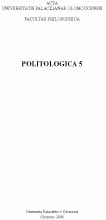New thinking, the Prague Spring and Czechoslovakia: the role of ideas in Gorbachev’s foreign policy
New thinking, the Prague Spring and Czechoslovakia: the role of ideas in Gorbachev’s foreign policy
Author(s): Karel KoubaSubject(s): Politics / Political Sciences
Published by: Univerzita Palackého v Olomouci
Keywords: Mikhail S. Gorbachev; Soviet foreign policy; New Thinking; Czechoslovakia; Prague Spring; 1989 revolution; Cold War
Summary/Abstract: The article argues that the Soviet New Thinking introduced by Mikhail S. Gorbachev had a tremendous impact on the collapse of Communism in Eastern Europe. By employing an ideational, as opposed to material, explanation of the origins of the New Thinking, this article identifi es the political actors’ perceptions of the Prague Spring of 1968 as the prominent causal mechanism of the changing Soviet foreign policy towards Czechoslovakia. This sea-change in Soviet foreign policy in turn contributed to the unexpected wave of revolutions in 1989. Making use of newly available documents from the period, this article traces the origins and impact of the New Thinking in general, and the perceived legacy of the Prague Spring in particular. Apart from examining the Czechoslovak case, the article aims at advancing the theoretical agenda about the end of the Cold War and analyses of political change more generally. It shows that material explanations (i. e., those that focus solely on actions based on material self-interest) of social change cannot capture these phenomena in their entirety. Instead it is argued, that ideas with non-material origins can play a role of an autonomous agency.
Journal: Politologica. Acta Universitatis Palackianae Olomucensis
- Issue Year: 2006
- Issue No: 5
- Page Range: 171-194
- Page Count: 24
- Language: English

